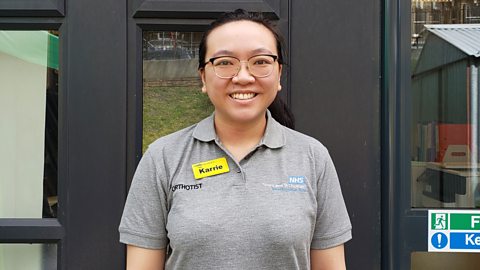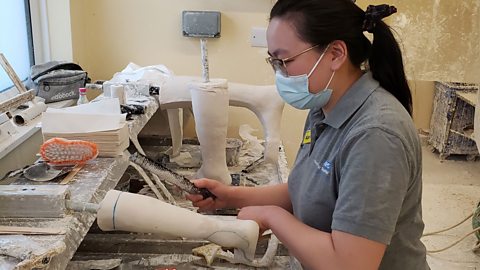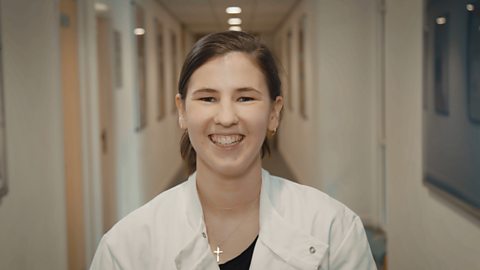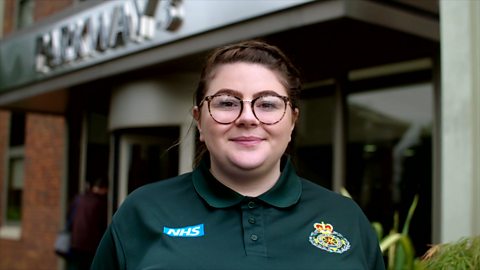Meet Karrie, an orthotist for Guy's and St Thomas' NHS Foundation Trust. Part of our Bitesize world of work series.

The best part for me is talking to someone and making a difference in their life in terms of making them walk a bit less painfully or fall less often knowing that it's had a positive impact of someone's life.


What does an orthotist do?
Orthotists specialise in orthoses, which are any type of device that can help or have a positive impact on a person's life. The most common example would be if someone has had a stroke which has caused weakness in their legs or arms, we give them a device to help support them so it's easier for them to walk and reduces the likelihood of falls.
What does a day in your job look like?
I mostly work in a rehabilitation centre. Patients come to see me and I have a chat with them about the kinds of activities they want to do in their lives and what is stopping them. I assess things like muscle strength, pain and stiffness and then use all of that information to try to come up with suggestions for devices that could help them achieve their goals.
If an off-the-shelf device doesn't work for a patient, then I'll take a cast in the clinic so I can tailor the device to them too.
Did you always know what you wanted to do for work?
I knew I wanted to work in healthcare but I had no idea in which role! I went to a local university open day at the University of Strathclyde and it happens to be one of the only two universities in the UK that do prosthetics and orthotics (the other one being the University of Salford) so I was quite fortunate to have been in the right place at the right time to find out about this career path. I saw them demonstrating a robotic arm at the open day and got sucked in! So, I went on to do the course.


Prosthetists work with prostheses. Prostheses are artificially made body parts that replace a missing part of the body, such as the lower leg.
Orthotists work with orthoses. Orthoses are devices used to assist an existing body part which has some sort of reduction in function.

What was your pathway to getting into your role?
My uni course included two mandatory placements, one in prosthetics and one in orthotics. It's through those placements that you really get to see how all the theory that you've learnt applies to a person in real life. It can also really help you pin down whether you want to go into the prosthetics side, or the orthotics side.
In my day, you could only get into this field through a uni course, but they are bringing in more options now like apprenticeships.
How are the job prospects like for working in orthotics?
Because there are only two universities in the UK that offer a prosthetics and orthotics course, employers will sometimes come directly to the universities to look for new people for job openings. As there aren't tons of people qualified in this area, the job prospects are good. The location of the jobs might not be the most ideal for you though ÔÇô you might have to move for work.
What skills are important for an orthotist?
- Time management ÔÇô for sticking to the right length for your appointments
- Organisation ÔÇô for dealing with a busy clinic environment
- Patience ÔÇô for communicating with people who are understandably frustrated because they're facing obstacles and looking to you for a solution
- Honesty ÔÇô for acknowledging that there are limitations, you don't have a magic wand, so you have to be upfront if there isn't a solution for something.
Which school subjects have helped you in your role?
Biology and Physics have definitely been the most helpful subjects. Having studied English was really useful when I got to uni in terms of the assignments and I used Maths a lot for the calculations we did as part of Material Science too.
Karrie's advice:
- If you can, talk to someone already doing the course you're interested in to get a real sense of what it's like
- If you try a pathway and it's not for you, remember you'll still have gained so many skills that you can use elsewhere
- Be humble and open to listening to people's advice. Assuming you know it all in your job won't do you any favours!

What to expect if you want to be a prosthetist-orthotist
- Prosthetist-orthotist average salary: NHS band [5-7]. Read more about . Salaries will differ in private healthcare.
- Prosthetist-orthotist typical working hours: 37 to 40 hours per week. You could work on shifts (days / nights / weekends)
What qualifications do you need to be a prosthetist-orthotist?
You could get into this role via a university course or an apprenticeship. For an undergraduate university course, or a degree apprenticeship, youÔÇÖll usually need four or five GCSEs, or equivalent, at grades 9 to 4 (A to C) and A-levels, or equivalent. Alternatives to A-levels include taking a T-level (England-only), which is equivalent to three A-levels. Check with your course provider which alternative qualifications they accept. Alternatively to a degree or degree apprenticeship, you could do an advanced apprenticeship, which requires five GCSEs, or equivalent, but not A-levels, or equivalent.*
This information is a guide and is constantly changing. Please check the website for the latest information and all the qualifications needed. (sources: LMI for All, National Careers Service)
For careers advice in all parts of the UK visit: , , and .

Find out more
For more information on becoming a prosthetist/orthotist, you can check out:
- The
- The .

Becky: prosthetist. video
Becky helps people who are missing limbs or whose limbs need support.

Sarah: occupational therapy assistant
Sarah specialises in neurosciences and works with patients who have injuries and brain tumours.

Job inspiration: Careers in healthcare and frontline services. collection
Hear from people working across the healthcare sector and in frontline services, including some roles you may not know existed!
